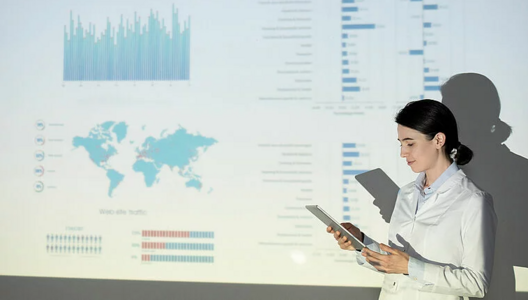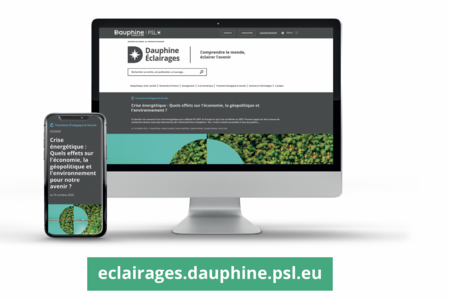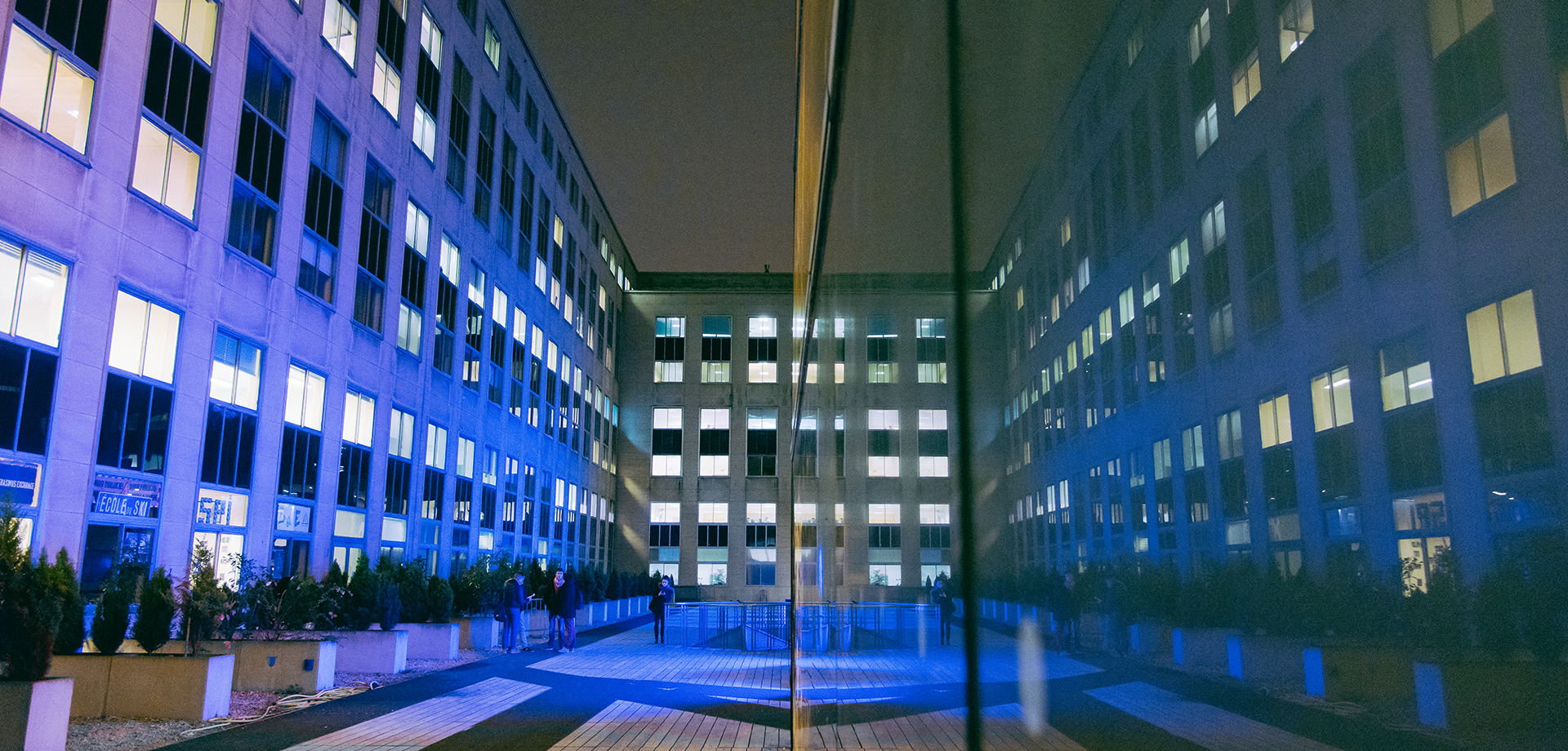The Dauphine Durable program and its goals
Environmental topics concerning sustainable development and CSR are central to research at Dauphine, which is committed to tackling the major societal challenges of the 21st century. The multidisciplinary and interdisciplinary Dauphine Durable program, which was put in place by Université Paris Dauphine – PSL as part of its social responsibility policy, aimed at developing strategic initiatives within the university community concerning the Objectives of Sustainable Development set by the United Nations, as well as environmental issues such as climate change and biodiversity loss.
The Dauphine Durable program must foster the development of multidisciplinary and inter-disciplinary research on these issues, by forging links between various laboratories. For Université Paris Dauphine – PSL, it is also a matter of asserting its position as a responsible university and helping to develop international projects on these topics.
The program is led by a Steering Committee made up of Dauphine research professors.
Objectives
- To encourage inter-disciplinary collaboration in ecological transition and development
- To identify and support the work and initiatives of the research units in terms of ecological and social transition
- To develop interactions between science and society To promote ethical and responsible research
Achievements
Sustainability research seminar - Organizational and decision-making methods in the face of environmental, social and democratic challenges

In order to initiate and support the development of an interdisciplinary and inter-laboratory dialogue on these issues within the University, a research seminar on “Sustainability” was set up in September 2022.
By understanding this concept in a plural sense, this seminar aims to question the organizational and decision-making methods with regard to their environmental, economic, financial, social and democratic sustainability. Each session is structured around a theme or a research object: two communications from two different disciplines are presented and proposed for discussion.
These seminars are collected in the university’s new online media: Dauphine Eclairages
Upcoming seminars
- “Expertise, knowledge and access to data in control of chemical risks”
September 27 from 2:00 p.m. to 4:00 p.m. | Espace One
- Henri Boullier, Research Associate at the CNRS (Interdisciplinary Research Institute in Social Sciences, Université Paris-Dauphine – PSL): « Toxic ignorance: when regulatory knowledge disrupts control of chemicals »
- Béatrice Parance, University Professor, Université Paris Dauphine-PSL, CR2D: « Toxic ignorance: how can legal tools help us access data on chemical risks? »
- “Reinventing Indicators for Ecological and Social Transition ?”
November 15 from 9:30 a.m. to 12:00 a.m. | Salle C108
- Anna Creti (LEDA) « Using the Energy Performance Diagnosis (DPE) to Inform on the Challenges of Renovation »
- Louis Drumeaux (DRM) « What Purpose for Non-Financial Indicators? Rethinking Our Tools for an Integrated Approach to the Preservation of Natural and Human Entities »
- Dominique Méda (IRISSO) with Florence Jany-Catrice (University of Lille, Clersé)
- Alexis Tsoukias (LAMSADE)
- Nicolas Fayard (LAMSADE)
Inventing sustainable resource allocation and management - June 11, 2024
- Hugo Gilbert, Associate Professor, Université Paris Dauphine – PSL, and Stefano Moretti, Research Director at CNRS, LAMSADE, « Tools from Computational Social Choice to reduce GHG emissions in a laboratory »
- Justine Loizeau, PhD in Management Sciences, Université Paris Dauphine – PSL, DRM, « Imagining Other Forms of “Sustainable Resource Management” »
Waste: achieving ecological, social and democratic sustainability - November 23, 2023
- Valérie Guillard, University Professor, Université Paris Dauphine - PSL, DRM, « When waste clashes with conservation and social justice »
- Stéphanie Monjon, Assistant Professor HDR, Université Paris-Dauphine - PSL, LEDa, and Béatrice Parguel, CNRS Research Director, DRM, Université Paris-Dauphine - PSL: « Understanding waste disposal behavior at the university: emotion, context and information »
- Marie Teyssier, doctoral student, INRS and Université Paris-Dauphine - PSL, Interdisciplinary Research Institute in Social Sciences: « WEEE is disposed of... then what? Preventing workplace risks in the Waste from Electrical and Electronic Equipment (WEEE) recycling sector »
- Myriam Merad, CNRS Research Director, LAMSADE, Université Paris Dauphine – PSL : « Participative governance of radioactive waste management »
Law and Management Standards in Sustainable Development - 13 juin 2023
- Pauline Barraud de Lagerie, Assistant Professor (Interdisciplinary Research Institute in Social Sciences), « Making the responsibility of multinationals, through the prism of the first disputes on the ‘duty of vigilance’ »
- Béatrice Delzangles, Assistant Professor (CR2D), « Human rights supporting sustainable development »
Measures and Leadership - April 17 2023
- Clément Carn, Assistant Professor (DRM) « Use of the notion of “human capital” in socio-environmental accounting procedures »
- Meltem Öztürk-Escoffier, Assistant Professor HDR (LAMSADE) « Analysis of the Human Development Index from the point of view of multicriteria decision aids »
What agro-ecological transition? - 20 October, 2022
- Nicolas Fortané, Research Associate at INRAE (Interdisciplinary Research Institute in Social Sciences, Université Paris Dauphine – PSL): «“Antibiotic-free” labels, a missed opportunity? When agro-ecological transition leads to greater industrialization of livestock farming »
- Amélie Gabriagues, Doctoral Student, and Lionel Garreau, HDR Lecturer, Université Paris-Dauphine – PSL, DRM: « The hybrid nature of short agricultural supply chain business models »
- Maxime Ollier, Doctoral Student, INRAE, LEDA: « Extreme temperatures and inequality: Evidence from French agriculture »
Managing the commons: the case of fisheries - 28 September 2022
- Rashid Sumaila, Professor of Economics at the University of British Columbia (Canada), Director of the Fisheries Economics Research Unit at the Institute for the Oceans and Fisheries: « Sustaining the global ocean is crucial for our lives”
- Loïc Henry, Lecturer in Economics at Université Paris Dauphine – PSL, LEDA: « Managing the commons: Illustrations from the agricultural sector”
- Claire Nouvian and Frédéric LeManach, BLOOM Association, « The financial side of fisheries”
Dauphine Durable University Workshops
Dauphine Durable University Workshops 2024 are devoted to the way in which ecological and social transition issues affect our research activities, as both research object, in each of our disciplines and in an interdisciplinary manner, and as a requirement for changing the way in which we do research.
A Dauphine research map on issues of the ecological and social transition
Université Paris Dauphine – PSL is working to compile all Dauphine-based research on these issues with the following aims:
- Improve the University's knowledge on these topics and increase their visibility
- Link up and promote the development of multidisciplinary research, connecting the University’s various different labs
- Encourage multidisciplinary collaborations within PSL As an example, the TERRAE 2024-2029 research project led jointly by Dauphine and ENS-PSL and involving PSL departments in biology, life sciences and chemistry, aims to structure interdisciplinary collaborations on environmental transition issues.
- Produce clear reporting to comply with certification requirements and the many processes the University is engaged in: SD/SR certification, EQUIS, etc.
Support for labs in decarbonization of research projects
Université Paris Dauphine - PSL commits to supporting initiatives led by the research units and to making them known within the Dauphine community in the aim of sharing best practices.
It also commits to providing structures with the tools to assess and reduce the impacts of their activity on the environment.
For example, several labs produce their own GHG assessment and ask their teachers and researchers to calculate the carbon footprint of their activity using a digital tool.
This tool has the dual benefit of individual awareness and collective reflection, by providing aggregated data for each laboratory each year, to be used for discussion in the laboratory meeting or in the annual general meeting. The tool is available to all Dauphine labs.
Other labs have set up committees: a Gender Parity committee and an Environmental Responsibility working group at the CEREMADE since 2021, a Climate Transition committee in 2023 at the LEDa, a working group on ecological issues at DRM in 2023, a group on research into ecological and social transitions at LAMSADE in 2024.
Dauphine Éclairages, new scientific media

Dauphine Eclairages deciphers major contemporary issues and contributes to the public debate by drawing on the work conductedin Dauphine’s labs.
This platform for sharing and disseminating academic knowledge to the general public offers in-depth papers, thematic dossiers, podcasts and videos to help you better understand the world and shed light on the future.
Publications on the ecological and social transition are given pride of place and are grouped in one of the six major themes.
The ustainability seminar sessions are published on the knowledge portal, as part of a specific collection of the same name.
Promoting ethical and responsible research
The university created an Ethics in Research committee and took on a Scientific Integrity officer in 2018, and an Ethics adviser in 2023.
The Ethics in Research committee, which has been recognized in France since it was founded, is registered as an Institutional Review Board (IRB) in the United States, which allows it to issue compliance certificates, something that is increasingly requested by the best international journals.
A one-stop-shop was introduced in July 2023 to facilitate communication between the various bodies of Dauphine charged with examining certificate applications. Training in scientific integrity and ethics in research is offered to the Dauphine community, including PhD students.
Material energy efficiency and social justice initiative
This research initiative, coordinated by Valérie Guillard, Professor at Université Paris-Dauphine PSL, Director of DRM (Dauphine Recherches en Management), is part of Dauphine Durable, a multidisciplinary program that aims to develop structural initiatives around issues of the environment, equality and solidarity.
Jointly led and financed by ADEME and the Agence du Don en Nature, it has the following aims:
- to produce and disseminate knowledge on transformation of lifestyles, particularly those of people living in poverty and deprivation, as part of the ecological transition process
- to study the relationship with material energy efficiency and its impact on the population
- to build tools for information and awareness-raising, in particular for organizations to combat poverty and deprivation
Speakers will also discuss the origins of this initiative and its issues at a time when ecological transition and social justice need to come together.
